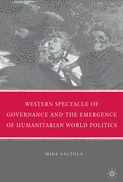“Aaltola has written an important and highly stimulating book that asks serious questions about pain and the humanitarian response. Buddha’s injunction to be ‘compassionate’ will never seem simple again.”–Stephen Chan, Professor of International Relations, University of London
Humanitarianism has arguably become the key frame through which multifarious actors of the world sense each others’ legitimacy and determinate their power positions. Moreover, the “humanitarian paradigm” has become an essential expression of what is meant by international community and the contemporary hegemonic order. The practices comprising the present human polity are based on historically important political bodies. We feel not only for an individual suffering but also for the suffering of hegemonic and national bodies. Much of humanitarianism can be understood as a contagious and highly emotional response to the violent movements stirring these embodiments. The book argues that the compassion felt towards the distant other becomes a vital element in the vortexes of violent bodily encounters constituting humanitarian emergencies and legitimizing military interventions. The book examines political compassions at various sites: September 11th, EU and U.S. borders, Iraq and Afghanistan, Darfur, SARS and Avian Flu, and U.S. HIV/AIDS diplomacy.
Aaltola is also the author of the book: Sowing the Seeds of Sacred: Political Religion of Contemporary World Order and American Era. (Brill. Leiden, 2008).

